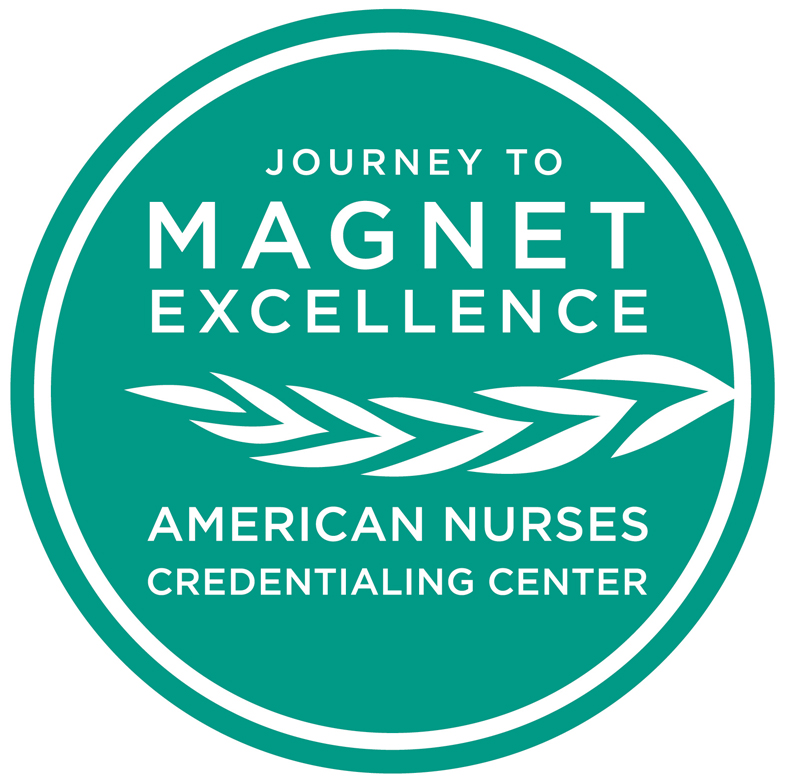Hospital begins journey to earn Magnet accreditation

Led by the Nursing Department, the Clinical Center has started the journey to achieve accreditation from the American Nurses Credentialing Center as a Magnet® hospital. Magnet is the highest and most prestigious distinction that a healthcare organization can earn for nursing excellence and innovation. Only 8% of U.S. hospitals and 3% of hospitals worldwide have earned a Magnet certification.
Magnet organizations receive more than a green seal of approval, they become the most optimal workplace for nurses and empower their nurses to be highly skilled, high-functioning innovators.
As a result, the tangible benefits that Magnet organizations experience include attracting and retaining top nursing talent; exponential improvements in patient care, safety and satisfaction; an enhanced culture of cross-disciplinary collaboration; advancements in nursing standards and practice; and achievement of nursing department and organizational goals. Leadership and staff at the Clinical Center are putting in the hard work necessary to join this elite group.
"While achieving Magnet status will directly benefit our nurses, the evidence is clear that Magnet hospitals also produce better outcomes for patients," Dr. James K. Gilman, CEO of the NIH Clinical Center, said at a Patient Advisory Group meeting in 2019. "Our efforts with the Nursing Department and across our interdisciplinary teams to achieve this accreditation are fully supported by me and by the Clinical Center Research Hospital Board as the next step in our evolution to high reliability and patient safety."
The Magnet accreditation process creates a framework for nursing excellence, research and measurement of outcomes. Through this framework, the American Nurses Credentialing Center evaluates applicants across a number of components including the quality of nursing leadership, coordination and collaboration across specialties and the quality and delivery of patient care. To achieve and maintain Magnet accreditation, the Nursing Department must create and implement action plans developed and powered by qualitative and quantitative data which demonstrate that they have created the vision, systems and environment to transform their department and the Clinical Center.
The Nursing Department must also show that nurses are trained and empowered to contribute new knowledge and improvements to patient care, the workforce, the Clinical Center and the nursing profession. This very rigorous certification process, which can take from two to four years to complete, includes on-site evaluations by the American Nurses Credentialing Center and a time of public comment for patients and staff to share their experiences and opinions of the nursing department and the Magnet journey.
"This process will give us a good hard look at the many things that we can do better for our nurses and for our patients. Our goal is to give the best patient care possible and create the best patient experience within the context of a very robust and professional nursing department," added Dr. Gwenyth R. Wallen, Chief Nursing Officer at the hospital. "We will need everyone's support across the institutes and the Clinical Center to achieve this."
Rachel Coumes, the nursing program director leading the Magnet accreditation effort, hosted two virtual events, a Magnet invitational in August and a Magnet kick-off in October for Clinical Center staff to learn about Magnet, share their enthusiasm for the journey and the benefits. Coumes has selected Magnet Ambassadors from the nursing department to enhance communication between nurses in their work areas and the Magnet core team. Microsoft Teams and the Clinical Center's intranet are used as platforms for Magnet information and resources. Coumes is planning a special interest virtual event in early 2021 to address questions and provide updates on the application process.
Coumes emphasized, "While I want to grow the momentum of pride and excitement for our Magnet journey, I want to make sure that we are completely transparent about our process behind the scenes to earn our acceptance into the program."
Studies find that Magnet-recognized organizations exhibit:
Quality and Safety
- Higher adoption of National Quality Forum safe practices
- Lower overall missed nursing care
- Higher support for evidence-based practice implementation
- Higher nurse-perceived quality of care
- Higher patient ratings of their hospital experience
Patient Outcomes
- Lower mortality rates
- Lower failure-to-rescue
- Lower patient fall rates
- Lower nosocomial infections
- Lower hospital-acquired pressure ulcer rates
- Lower central line-associated bloodstream infection rates
For Nurses:
- Positive work environment
- High nursing satisfaction
- Effective nursing recruitment and retention
- Autonomy in practice
- Professional development opportunities
Nurses employed at Magnet hospitals experienced higher levels of empowerment and job satisfaction as compared to nurses at non-Magnet hospitals.
For Patients:
- Improved clinical outcomes
- High patient satisfaction scores
- Engaged, educated and expert nurses
Over a thirteen–year study period, patients at Magnet hospitals have experienced significantly better outcomes than those receiving care elsewhere.
- Lester Davis